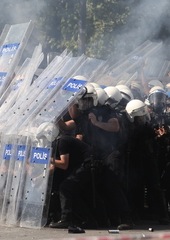Erdogan’s Fundamental Miscalculation
Why do the AK Party’s own followers have doubts about Erdogan’s path for Turkey’s future?
June 14, 2013

It has been clear for over a decade that Turkey’s major obstacle on the road to lasting success was the extreme arrogance of its overpowering Prime Minister, Recep Erdogan. His supreme confidence could easily lead him astray.
And now it has. Erdogan’s choice to be a divider, not a uniter, will either be the source of his downfall — or the country’s decline.
As Mr. Erdogan will soon learn the hard way, strong demographics (which Turkey has) are not an inherent sign of strength.
Without a strong economy (which the country used to have, until now), strong population growth is a recipe for eventual political and social disaster.
Voters can as easily become disenchanted with a leader who no longer delivers the goods as they were happy with him earlier. People cannot live off religion or Islamist ideology alone.
As a result, a surprising political issue emerges: It is in the AK Party’s self-interest to let the tempest that is Erdogan sideline himself.
If there was ever a time for the avuncular, conciliatory and folksy smart Mr. Abdullah Gül, Turkey’s president, to stay in office, it is now.
The key quality that Turkey now most needs to safeguard its own future is a father figure, someone who can spread his wide arms over the two countries that make up Turkey.
Those two “countries” are not Istanbul versus Anatolia, as is often believed.
For that, Istanbul itself has become “too Anatolian,” after decades of immigration from the country’s hinterlands into Istanbul’s ever more sprawling suburbs.
The real battle is between modernity versus religion.
Young people, the country’s future, have made their choice.
And they have done so, shockingly for the AK Party stalwarts, not just in Istanbul, Ankara and Izmir, but also in about 200 other cities.
One cannot imagine a clearer vote of no confidence.
How the country will now turn and whether it will recover depends crucially on the AK Party’s real power base, the successful Muslim businessmen all around the country.
Let’s remember that Turkey’s path to solid growth was not rooted in the fact that the AK Party managed to tap deeply into the aspirations of the hinterland voters, even though that is widely believed.
The party’s real achievement was that these voters were satisfied because they saw economic growth spreading around the country.
The key source of that growth is Turkey’s medium-size and large businesses. They managed to integrate themselves into the global economy, mainly into Europe and Asia.
Their resounding economic success had come under pressure even before the Taksim explosion.
Turkish businessmen are now faced with competition from Spanish firms, after the recent labor market reforms in Spain have made that country cost-competitive again.
In addition, because of Erdogan’s intransigence, Turkey is now operating under a cloud: As things stand, under Erdogan Turkey has become too politically risky.
And all the impressive achievements by his team of very competent economic managers are at risk of getting undone.
What the Prime Minister does not comprehend is that by criticizing global markets, he is digging a deeper hole for the country’s recovery — and hence also for himself.
For all his pomposity and supreme confidence, Erdogan would be nothing without the economic success story. Now that he has carelessly undermined it, he is risking his own eventual downfall.
He has already lost credibility with all those who believed that a proper understanding of his country’s long-term self-interest would dictate that he always keep his own worst tendencies in check.
This goes far beyond the Kemalists and old Istanbul business elites. Erdogan has proved incapable of restraining himself in the larger interests of his nation.
Turkey is facing a fundamental choice. Without a political opposition able to take advantage of Mr. Erdogan’s self-destructiveness, it will likely come down to the AK Party’s stalwarts and their supporters in the business community.
They must choose to reassess their own long-term interests. They must choose between loyalty to Erdogan and protecting Turkey’s immense future potential.
Dropping a leader as a consequence of inner-party democracy may be unheard of in this wider region, but this is precisely what it will take for Turkey to get back on track.
Otherwise, the economic fallout is growing by the day.
Tourists may well decide to give the Greeks another look, not as a matter of European solidarity, but due to Erdogan’s deliberate choice of playing with fire.
What about Turkey’s young? Turkey’s urban? Turkey’s creative elites?
Turkey’s urban professionals are often extremely well educated and, unlike young Spaniards, very skilled in languages. They would be assets to any country where they chose to live.
Hence my conclusion: The ultimate schism in Turkey’s society concerns the two souls inside the AK Party itself — modernizers vs. conservatives.
Until recent events, these two groups were in an effective, albeit uneasy alliance. No longer. It is time to choose.
Editor’s note: This article was revised slightly on June 19 to include mention of global markets.

